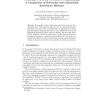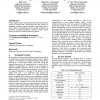10899 search results - page 19 / 2180 » The GP Programming System |
131
Voted
EC
1998
15 years 2 months ago
1998
In this paper we first review the main results obtained in the theory of schemata in Genetic Programming (GP) emphasising their strengths and weaknesses. Then we propose a new, s...
104
Voted
GECCO
2004
Springer
15 years 8 months ago
2004
Springer
In a series of papers [3-8], Daida et. al. highlighted the difficulties posed to Genetic Programming (GP) by the complexity of the structural search space, and attributed the probl...
119
Voted
EUROGP
1999
Springer
15 years 6 months ago
1999
Springer
Abstract We consider a form of phenotype plasticity in Genetic Programming (GP). This takes the form of a set of real-valued numerical parameters associated with each individual, a...
137
Voted
GECCO
2006
Springer
15 years 6 months ago
2006
Springer
Genetic Programming offers freedom in the definition of the cost function that is unparalleled among supervised learning algorithms. However, this freedom goes largely unexploited...
166
click to vote
GECCO
2005
Springer
15 years 8 months ago
2005
Springer
Turing complete Genetic Programming (GP) models introduce the concept of internal state, and therefore have the capacity for identifying interesting temporal properties. Surprisin...


